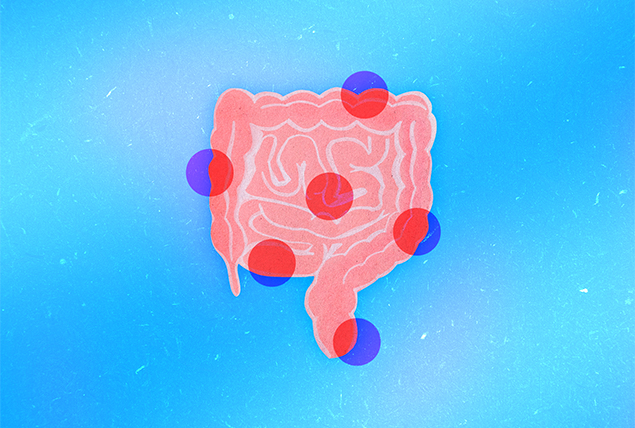Can Stress Cause Irritable Bowel Syndrome?

The exact cause of irritable bowel syndrome (IBS) is not known. The condition is categorized as a chronic biopsychosocial disorder and emerges due to various biological, psychological and environmental reasons. All of the complex factors at play in the development of IBS make it difficult to determine the exact processes that cause it, but stress can make IBS worse.
Due to this complexity, IBS is typically classified based on the symptoms that a patient experiences. These symptom-based subtypes include the following:
- IBS-C. Describes people who are constipation-prone
- IBS-D. Describes people who are diarrhea-prone
- IBS-M. Describes people who have a mix of constipation and diarrhea
- IBS-U. Describes people who have IBS but don't fall under the above categories
"Some of the most common signs of IBS are related to bowel habits. When you have IBS, one of the first things you may notice is that your poops have changed," said Amanda Sauceda, a registered dietitian nutritionist and the founder of The Mindful Gut in Long Beach, California. "You may find it more difficult to poop or have to run to the bathroom. You may notice that your poop has changed in texture."
Harder poop that is sometimes pellet-like could indicate things are moving too slowly in your digestive tract and point to constipation. Softer stool that has the consistency of soft serve ice cream may indicate the digestive tract is moving too quickly.
"Having abdominal pain can also be part of this and is one of the symptoms that are screened when diagnosing IBS," Sauceda said.
Will IBS get worse?
IBS is not a progressive condition and won't necessarily get worse as time goes on, according to Anna Mapson, a registered nutritionist in Bristol, England, who specializes in IBS. Some people may experience sudden symptoms. Others may find their IBS comes and goes throughout their lives.
"My clients often report worse symptoms during periods of stress," Mapson said. "Around 45 percent of people with IBS have mild symptoms, and 25 percent have severe symptoms, which might even lead to them avoiding leaving the house."
Getting over IBS isn't all about food. Patients need to look at how they eat, when they eat and what they eat, she added. Plus, they need to examine their lifestyle choices. How much sleep do they get? How much exercise do they get? How much stress do they experience?
IBS symptoms can be continual or stop and start over time.
"The primary symptom of IBS is abdominal pain, especially abdominal pain associated with a change in bowel habits," said Zhenya Gerson, a colonic hydrotherapist, gut health specialist and co-owner of PROPPR, a maker of a poop stool. "This change can be characterized by the frequency or consistency of your stool. If the pain occurs along with diarrhea or constipation, then you may have IBS."
According to Gerson, some additional symptoms of irritable bowel syndrome—they are different for each person—include the following:
- Changes in the frequency of bowel movements
- Unexplained bloating
- Mucus in the stool
- Increased gas
- Weight loss
- Changes in the appearance of bowel movements
- Diarrhea at odd hours of the day or sometimes all day
- Unexplained vomiting
- Constipation
- Abdominal pain and cramping
- Persistent pain that doesn't go away after passing gas
Keep in mind that IBS is a functional disorder, which means it does not typically cause structural damage to the digestive tract. And while the exact pathology of IBS is not fully understood, it is thought to be related to a combination of factors, including abnormalities in the way the digestive system functions, changes in the gut microbiome and certain negative psychological states.
Can stress make IBS worse?
IBS is indeed a fascinating condition because it shows us how people's mental states can trigger physical symptoms in the body.
"Stress levels are a major factor for increasing your risk of IBS," Gerson said. "Researchers don't believe stress actually causes IBS, but it can increase the frequency and severity of the symptoms. It seems to sometimes be linked to those who have had a traumatic event in their life or have ongoing daily stress and anxiety that is not managed."
Internal organs, including the colon, are smooth muscle tissue. When we experience stress, our muscles, including the internal organs, may tighten up, she added. The last time you experienced stress or anxiety, how did your body feel? Did your shoulders get tight? Did your lower back begin to ache?
"These are signs of stress we can 'see' and feel clearly," Gerson said. "Within the bowel, it's a bit harder to see, but if we pay attention to our entire body, it will show signs."
Gerson said adding food to stress and anxiety can exacerbate IBS symptoms.
"The body digests food when it's in a parasympathetic state, also known as 'rest-and-digest,'" she said. "If we are anxious, stressed, angry, fearful or worried, or in a sympathetic state of 'fight-or-flight' and sit down to have a meal or even a snack, the body is not in a state to actually process and digest that food."
What are the ties between IBS and psychological distress?
It's no secret that stress is bad for one's long-term physical health. IBS suggests it's not great for your short-term health either.
Researchers have found strong associations between stress, sleeping difficulties, depression, anxiety and overall reporting of IBS symptoms in patients. One study found that 52 percent of IBS patients will have either depression or anxiety.
This is further corroborated by other studies, which have suggested that up to 72 percent of patients who experience severe IBS symptoms also exhibit some psychological comorbidities, including depression and anxiety.
That IBS and psychological distress seem to be linked suggests the presence of anxiety, depression or stress in a patient could also indicate they have IBS. Further, anxiety, depression and stress could be considered symptoms of the condition due to their manifestation in a large number of IBS patients.
According to experts, negative moods and gastric motility (contractions of muscles around the abdomen) have been linked since the 20th century. The tendency for psychological states to cause physical symptoms in the body is known as somatization, and it is a common term used in IBS literature, even though the exact process behind it is not well understood.
Researchers have demonstrated that IBS patients have higher somatization scores compared to people with non-IBS-related diarrhea and constipation. These findings have been corroborated by other recent studies that demonstrate similar associations between psychological distress, somatization and the prevalence of irritable bowel syndrome in patients.
Why? One possibility is antidepressants. They are one of the treatment options for IBS patients and have been shown to be effective at alleviating symptoms. However, they are not typically recommended as a first-line treatment option due to potential risks and side effects. In some cases therapy has also been effective, but the quality of the evidence is still lacking, according to researchers.
"Having IBS can have long-term impacts on your mental health and overall sense of well-being," Gerson said. "People with an irritable bowel can develop a fear of going to public places, especially unfamiliar ones, due to concerns over not being able to find a bathroom or getting to a bathroom fast enough. This can result in withdrawal from family, friends and co-workers, making their life less enjoyable and causing more anxiety, stress and sometimes depression."
Plus, depression causes other symptoms, including a lack of motivation, withdrawal from others and all-over body aches.
"The connection between mind and body is strong when it comes to IBS and a factor I discuss thoroughly when seeing patients," Gerson added.
IBS patients also are more likely to have an overactive bladder compared to healthy controls. This is suggested by a number of studies, and 1 out of every 3 IBS patients will experience symptoms of an overactive bladder, which include:
- Frequent urination
- Strong urgency to pee, sometimes causing leaks
- The constant need to wake up and pee in the middle of the night (often more than once)
It doesn't only stop at the overactive bladder, IBS patients also tend to be more likely to have an overactive colon.
Myths and misconceptions about IBS
Despite its prevalence, irritable bowel syndrome is not well understood by many people—even those who have it. Let's dispel some myths with the help of experts.
Myth: Treatment is the same for everyone.
A misconception is that everyone with IBS would have the same symptoms and the same treatment will work for them, according to Erin Judge, a registered dietitian nutritionist who specializes in digestive disorders in Nashville. IBS can impact everyone differently and a lot of individualization is needed for proper treatment and control of symptoms.
Myth: The FODMAP diet can be followed long-term.
According to Mapson, the low-FODMAP diet is an intervention that works in the short term. It removes fermentable carbohydrates from the diet for a set period of two to six weeks; then, patients try bringing foods back through a carefully controlled process.
Staying on a restrictive diet for a long time will effectively starve your gut bacteria, and you can lose bacterial diversity by eliminating too many foods.
Myth: It's all in your head.
There is a gut-brain connection. This means that the role of our emotions and mental state can affect our digestion. However, this doesn't mean it's all imaginary. Those with IBS experience very real symptoms, and stress management alone won't make the condition go away.
Myth: You can't eat gluten or dairy.
Dairy and gluten aren't actually a trigger for everyone, according to Mapson. It's more commonly the fructans—they are one of the FODMAPs—in wheat rather than gluten itself that is a trigger for bloating and gas. With dairy, it's often higher-lactose foods such as milk (e.g., in latte or cereal) that might cause an issue, rather than all dairy. Often, small amounts of cheese and butter are fine.
IBS tests
Other gastrointestinal disorders and diseases must be ruled out before a doctor diagnoses IBS, according to Molly Warner, an accredited practicing dietitian and certified intuitive eating counselor in Queensland, Australia.
Tests for irritable bowel syndrome may include:
- Full blood examination (blood test)
- C-reactive protein (blood test)
- Nutritional markers (blood test)
- Blood test for coeliac disease (e.g., genetic screening or serology testing)
- Stool test for fecal calprotectin (to exclude inflammatory bowel diseases)
- Colonoscopy +/- gastroscopy (can be considered)
She added that a breath exam to test for lactose intolerance may be indicated. Often, the breath tests are hypersensitive and might diagnose lactose intolerance when a person might tolerate 12 to 15 grams of lactose spread across the day.
"Being a syndrome and not a disease, IBS symptoms and the perception of them is hugely different between people," said Jelena Vulevic, a gut microbiologist in Reading, England, with more than 20 years of experience. "There is no specific test, and diagnosis is obtained via exclusion of other conditions. This involves a family history, a description of symptoms and events that cause them if known, and blood and stool tests. Sometimes imaging studies may also be required."
"The best criterion for diagnosis is called Rome IV and should really be performed by the gastroenterologist and no other health care professional," she added. "I would strongly refrain from self-diagnosing but once the diagnosis is confirmed by a qualified healthcare professional, the monitoring can be self-performed by observing the symptom frequency, duration, changes, progression and triggers. The therapy is then adjusted according to these factors."
How to diagnose IBS using Rome IV criteria
The Rome Foundation is an international nonprofit organization whose mission is to further the understanding and management of functional gastrointestinal disorders such as IBS. They offer healthcare providers clear diagnostic criteria for IBS, which have evolved as the research on the condition advances.
The current version of the Rome diagnostic criteria is version IV, which was published in 2016.
Experts have shown that Rome IV is stringent as a benchmark for a conclusive IBS diagnosis. This means that if you were diagnosed with IBS using Rome III, it is not guaranteed this diagnosis will carry over to Rome IV. And about 15 percent of patients diagnosed using Rome IV would have failed to fulfill the Rome III criteria. The medical community's understanding of IBS is still evolving.
The Rome guidelines aren't meant to be used as a standalone diagnostic tool. They give physicians clear criteria when making a diagnosis. The criteria include the following:
- Abnormal stool frequency (either diarrhea or constipation) for at least 25 percent of bowel movements
- Abdominal pain or discomfort that is relieved by defecation and is associated with a change in the frequency or consistency of the stool
- At least two of the following three additional symptoms: bloating or a feeling of abdominal distension (swollen outward); a change in the appearance or consistency of the stool; or an urgent need to have a bowel movement
Get medical help for IBS
Consult your primary healthcare physician if you suspect you may be experiencing irritable bowel syndrome. If left untreated, it may result in a decreased quality of life.
"IBS is chronic, meaning it likely just won't go away," Judge said. "However, it is not known to increase the risk of colon cancer or lead to death. So the biggest risk of IBS being undiagnosed would be uncontrolled symptoms for the majority of someone's life."
Vulevic added that severe IBS symptoms aren't common and their presence doesn't increase the risk of any other condition. However, severe symptoms can cause quite considerable challenges to one's quality of life, to the extent some people aren't able to function or perform even basic daily routines properly.
Severe symptoms can also occasionally go beyond the point of management with lifestyle or dietary approaches and require the use of medication or counseling.
According to Warner, symptoms of IBS overlap with the following conditions:
- Celiac disease
- Intestinal cancers
- Inflammatory bowel disease (Crohn's disease, colitis)
- Diverticular disease
- Endometriosis
- Pancreatic dysfunction
- Endocrine (hormone) disorders
- Malabsorption of bile salts
- Pelvic floor disorders
IBS patients need to work closely with their healthcare provider to rule out other conditions.
The first thing to do is talk to your primary physician about your symptoms. They can arrange tests to rule out other conditions, according to Warner. The physician might recommend you see a specialist gut doctor (gastroenterologist), specialist dietitian, pelvic floor physiotherapist or other expert.
"Do not eliminate any foods before having the tests or before speaking with a dietitian," Warner said.


















